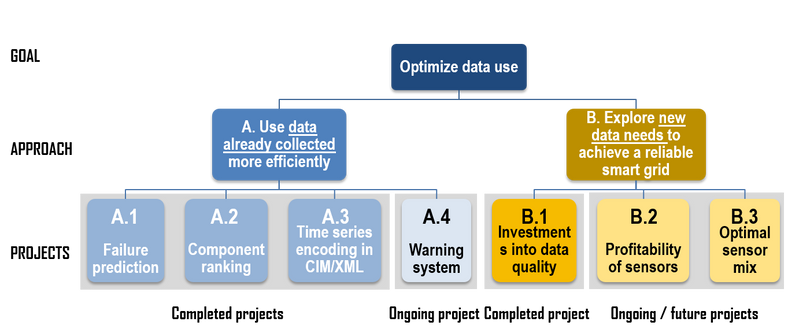Sylvie Evelyne Koziel
Om mig
I am a PhD student at the School of Electrical Engineering and Computer Science (EECS) at KTH. My main research interests are data analytics applied to power systems, and the transition to smart grids.
CURRENT RESEARCH
Observations
§ Distribution grids (medium to low voltage levels) are experiencing changes because of the integration of new loads, such as electric vehicles, and distributed generation such as solar panels. This represents a challenge to ensure the reliability of power supply.
§ Proposed solutions often include the development of a cyber-physical system, where sensors generate data that enable operators to model the grid, or even to create a ”digital twin”. The processing of the collected data provides information that supports efficient decision taking, to keep the grid reliable, even with a high penetration of renewables and electric vehicles.
Identified problems
In the distribution grid, the installation of sensors and meters on a large scale might encounter three major issues:
§ Economic issue: It might be unprofitable to install many sensors, compared to the benefits they provide. In other words, the benefits of collecting new data might become lower than the investments and operational costs when a critical number of sensors is reached.
§ Environmental issue: The collection, processing and storage of very large amounts of data can be power-intensive. In addition, the production of data generation devices consumes energy, and has an environmental impact. Thus, the energy savings achieved through the sensors might be overcompensated by the energy lost for data management.
§ Technical issue: Adding equipment and functionality always carries a risk of giving rise to new failure modes as well as new uncertainties (unpredicted failures, sabotage/hacking).
Proposed solutions and approaches developed in my PhD
The objective is to reflect on the value of data, and to adapt the ICT system accordingly, so that the physical grid evolves towards a smarter grid. The first step has been to establish the relations between data and grid performance. Then, two approaches have been identified:
▶Approach A: Use data already collected more efficiently
Grid operators today already collect large amounts of data, but only use part of it. The idea is to find methods that enable us to exploit the available data more efficiently i.e. extract more information without the need of generating more data.
Research question:What additional information can be extracted if the data available were to be mined more efficiently using data analytics?
▶Approach B: Explore how much additional data are needed to achieve a reliable smart grid
Research question:When/where is additional data profitable and useful to the grid manager?

PREVIOUS EXPERIENCE
2010-2018:
During my early career as consultant at Indicta (France) and Prognos AG (Switzerland), I worked on energy and climate policy, mitigation strategies and energy system modelling, on behalf of national government bodies as well as international corporations.
2009:
MSc in Engineering (FR.Ingénieur) majoring in Agronomy at AgroParisTech, Paris (France) French School of Agronomy
MSc majoring in Energy Economics and Sustainable Development at French Institute of Petroleum (IFP) and the French Center for Atomic Energy (CEA), Rueil-Malmaison and Saclay (France)
Kurser
Tillförlitlighetsanalys för elkraftsystem (EI2452), assistent | Kurswebb